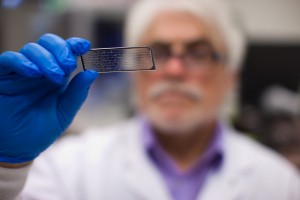-
 Minnesota
MinnesotaMayo Clinic Shares Lessons Learned from Genomics Clinic for Sequencing-based Cancer Care and Diagnostics
ROCHESTER, Minn. — It has been 1.5 years since Mayo Clinic opened the world’s first integrated multidisciplinary genomics service, the Individualized Medicine Clinic, which uses genomics and next-generation sequencing technologies to personalize treatments for patients with advanced cancer and complex diagnoses. In a special issue of the American Journal of Medical Genetics Part C, “Implementation of Genomic Medicine,” developers of the Individualized Medicine Clinic report the clinic’s structure and share lessons learned in everything from efficacy of genomics in patient care to struggles with insurance reimbursement and ethical dilemmas.

Konstantinos Lazaridis, M.D., a Mayo Clinic hepatologist and director of the Individualized Medicine Clinic, says the clinic is a natural extension of Mayo’s commitment to putting the needs of the patient first and that leaders in the Mayo Clinic Center for Individualized Medicine saw this opportunity as an imperative. Since opening the clinic, more than 30 percent of patients on a diagnostic odyssey have received answers through whole-exome sequencing.
“We now have the capability to understand cancer and diagnostic odyssey cases at their most fundamental level,” says Dr. Lazaridis. “And while we had many hurdles to overcome in designing and launching this clinic, we continue to improve our services, and that’s what matters to people who need our help.”
The Individualized Medicine Clinic accepts patients on a case-by-case basis and admits those deemed most likely to benefit from next-generation sequencing technologies.
Six lessons learned include:
- Within the health care administrative framework, a new clinic without departmental affiliation affords greater patient access and provider flexibility in meeting patient needs.
- Setting up an Individualized Medicine Clinic shares many similarities with launching a new clinical department, including considerable investment in information technology and infrastructure.
- Patients undergoing whole exome or whole genome sequencing usually want educational materials well before the procedure to give them time to think through the many complex decisions they will have to make about their genomic information. Even well-informed patients deserve and benefit from thoughtful conversations with certified genetic counselors.
- About half of Individualized Medicine Clinic patients receive at least partial insurance reimbursement, despite attempts by Mayo Clinic providers to secure prior authorization. And, estimation of out-of-pocket expenses for patients remains a challenge. The landscape of insurance coding and reimbursement has not yet caught up with medical capabilities.
- Success requires meaningful interaction and collaboration with different departments throughout an institution.
- Broad access to genomics services is possible through both tele-consultation and disparate health care providers who use a unified ordering system and electronic health record.
###
About Mayo Clinic
Recognizing 150 years of serving humanity in 2014, Mayo Clinic is a nonprofit worldwide leader in medical care, research and education for people from all walks of life. For more information, visit 150years.mayoclinic.org, http://www.mayoclinic.org/ and newsnetwork.mayoclinic.org.
About the Mayo Clinic Center for Individualized Medicine
The Mayo Clinic Center for Individualized Medicine is home to the Individualized Medicine Clinic, the world’s first integrated multidisciplinary genomics clinic, serving patients with advanced cancer and complex diagnoses. The center discovers and integrates the latest in genomic, molecular and clinical sciences into personalized care for each Mayo Clinic patient. Visit the Center for Individualized Medicine for more information.
MEDIA CONTACT:
Sam Smith, Mayo Clinic Public Affairs, 507-284-5005, newsbureau@mayo.edu







